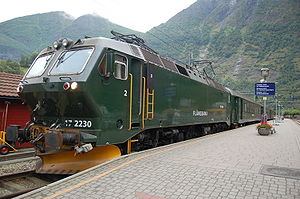NSB El 17
NSB El 17

NSB El 17 2230 on Flåm Line in the line's green livery |
| Type and origin |
| Power type |
Electric |
| Designer |
BBC and Henschel |
| Builder |
Thyssen-Henschel |
| Serial number |
H.32467–H.32472
H.32901–H.32906 |
| Build date |
1982, 1987 |
| Total produced |
12 |
|
|
|
| Performance figures |
| Maximum speed |
150 km/h (93 mph) |
| Power output |
3,000 kW (4,000 hp) |
| Tractive effort |
240 kN (54,000 lbf) |
|
|
|
| Type and origin |
| Power type |
Electric |
| Designer |
BBC and Henschel |
| Builder |
Thyssen-Henschel |
| Serial number |
H.32467–H.32472
H.32901–H.32906 |
| Build date |
1982, 1987 |
| Total produced |
12 |
| Performance figures |
| Maximum speed |
150 km/h (93 mph) |
| Power output |
3,000 kW (4,000 hp) |
| Tractive effort |
240 kN (54,000 lbf) |
The NSB El 17 is a class of twelve electric locomotives built by Thyssen-Henschel and Norsk Elektrisk & Brown Boveri (NEBB) for the Norwegian State Railways (NSB). The class was built in two batches, the first delivered in 1982 and numbered 2221–2226, and the second delivered in 1987 and numbered 2227–2232. The traction system of the El 17 was based on the DB Class 120 of Germany (BBC, AEG and Siemens) and were among the first in the world to feature three-phase asynchronous motors. The units were ordered to be used on the intercity Bergen, Dovre and Sørland Lines, but were plagued with technical faults (overheating traction equipment, transient voltages, etc.). The unreliability and lack of sufficient power forced NSB to instead use them in the regional Vestfold and Gjøvik Lines. With the delivery of the El 18, the first series was retired or used as shunters. The second series has been used on the Flåm Line since 1998.
The locomotives have a maximum 3,000 kilowatts (4,000 hp) power output and a 240 kN (54,000 lbf) tractive effort, allowing the locomotive to haul a six-car train. They run on a 15 kV 16 2⁄3 Hz AC power supply and are capable of operating at 150 km/h (93 mph). The units have a Bo'Bo' wheel arrangement, have regenerative brakes and weigh 64 tonnes (63 long tons; 71 short tons). The series was delivered at the same time as the Di 4 and have some similarities with the class.
...
Wikipedia

